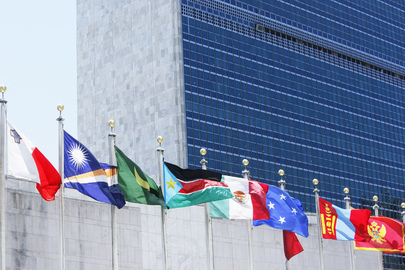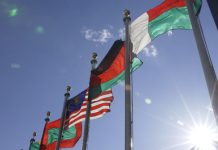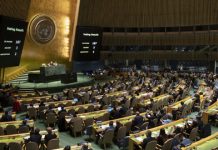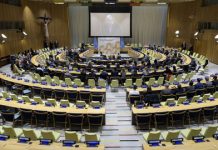“We are not prepared to inherit a legacy of complacency, nor can we continue to live in the shadow of these weapons,” she told the commemoration inside the gilded UN General Assembly Hall.
As the Youth Representative of the Republic of Kiribati, Ms. Johnson is one of the many young people around the world whose ancestors have been affected by the toxic aftermath of nuclear tests.
After her speech to the General Assembly where she urged Member States to take action, Ms. Johnson spoke to UN News about the effects that the past has had on her family and community.
Devastating Consequences
Between 1957 and 1962, the United States and United Kingdom conducted nuclear weapon tests on Kiritimati Island, now part of Kirbati, resulting in devastating consequences for the local population. Ms. Johnson’s late grandfather, who lived on the island, was 14 years old when the testing began.
“They were all gathered in a small tennis court, and they were only given a thin blanket without real protection,” she said, describing the scene just ahead of the detonation.
“They used that to cover their eyes from the flashes of the bombing,” she added.
The radiation Johnson’s grandfather was exposed to led to serious health implications including hearing loss and cognitive decline. These impairments followed him for the remainder of his life and affect his descendants till this day.
“My dad’s two older sisters were born prematurely and died shortly after that,” she said. “And similar cases were also found in other families in the community.”
Beyond the devastating impact on the people of Kiritimati, the tests also caused lasting environmental damage. According to Ms. Johnson, specific type of fish on the island are believed to be radioactive and when eaten, can make people “sick and nauseous.”
Push for disarmament
To address the irreversible harm on behalf of the younger generation of Kiribati – and the world – she called on Member States to support an international trust fund meant to offer needed assistance for the victims of nuclear testing. The trust fund was first jointly proposed by Kiribati and Kazakhstan in 2022.
Kiribati is a member of the Coordination Committee of the Treaty on the Prohibition of Nuclear Weapons (TPNW), a landmark agreement aimed at eliminating the nuclear threat.
Articles 6 and 7 of the legally binding Treaty stipulate that signatory parties must provide assistance to those affected by nuclear weapons under their jurisdiction, or as a result of their actions.
‘The lives of many depend on this’
A fourth-generation nuclear testing survivor, Ms. Johnson’s deeply personal experience with the human, environmental and social impact of nuclear weapons has only made her more determined to pressure the international community to build on the treaty entering into force in 2021.
“For the sake of all the mothers, children and future generations, I urge everyone to join in the Treaty for the Prohibition of Nuclear Weapons because the lives of many are dependent on this.”
Learn more about the UN’s actions against nuclear testing and proliferation here.
Source of original article: United Nations (news.un.org). Photo credit: UN. The content of this article does not necessarily reflect the views or opinion of Global Diaspora News (www.globaldiasporanews.com).
To submit your press release: (https://www.globaldiasporanews.com/pr).
To advertise on Global Diaspora News: (www.globaldiasporanews.com/ads).
Sign up to Global Diaspora News newsletter (https://www.globaldiasporanews.com/newsletter/) to start receiving updates and opportunities directly in your email inbox for free.






























